电话礼仪(英文)
- 格式:pdf
- 大小:106.48 KB
- 文档页数:2
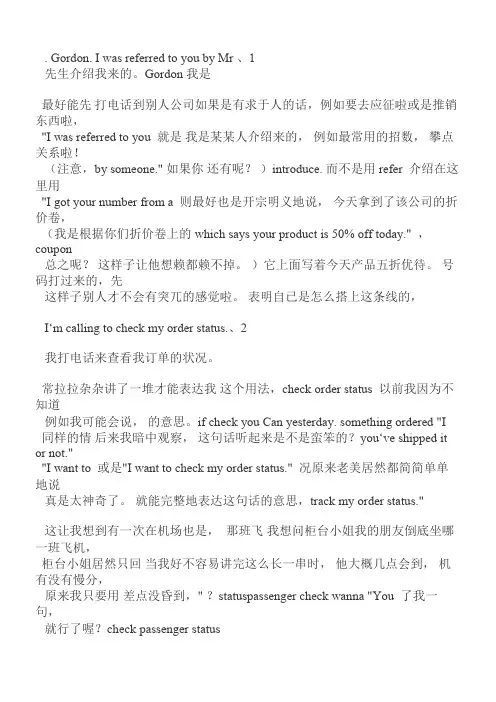
. Gordon. I was referred to you by Mr 、1先生介绍我来的。
Gordon 我是最好能先打电话到别人公司如果是有求于人的话,例如要去应征啦或是推销东西啦,"I was referred to you 就是我是某某人介绍来的,例如最常用的招数,攀点关系啦!(注意,by someone." 如果你还有呢?)introduce. 而不是用refer 介绍在这里用"I got your number from a 则最好也是开宗明义地说,今天拿到了该公司的折价卷,(我是根据你们折价卷上的which says your product is 50% off today." ,coupon总之呢?这样子让他想赖都赖不掉。
)它上面写着今天产品五折优待。
号码打过来的,先这样子别人才不会有突兀的感觉啦。
表明自已是怎么搭上这条线的,I‘m calling to check my order status.、2我打电话来查看我订单的状况。
常拉拉杂杂讲了一堆才能表达我这个用法,check order status 以前我因为不知道例如我可能会说,的意思。
if check you Can yesterday. something ordered "I 同样的情后来我暗中观察,这句话听起来是不是蛮笨的?you‘ve shipped it or not.""I want to 或是"I want to check my order status." 况原来老美居然都简简单单地说真是太神奇了。
就能完整地表达这句话的意思,track my order status."这让我想到有一次在机场也是,那班飞我想问柜台小姐我的朋友倒底坐哪一班飞机,柜台小姐居然只回当我好不容易讲完这么长一串时,他大概几点会到,机有没有慢分,原来我只要用差点没昏到," ?statuspassenger check wanna "You 了我一句,就行了喔?check passenger status3 . -1100 color printerI‘d like to p lace an order for a DL、彩色印表机的订单。
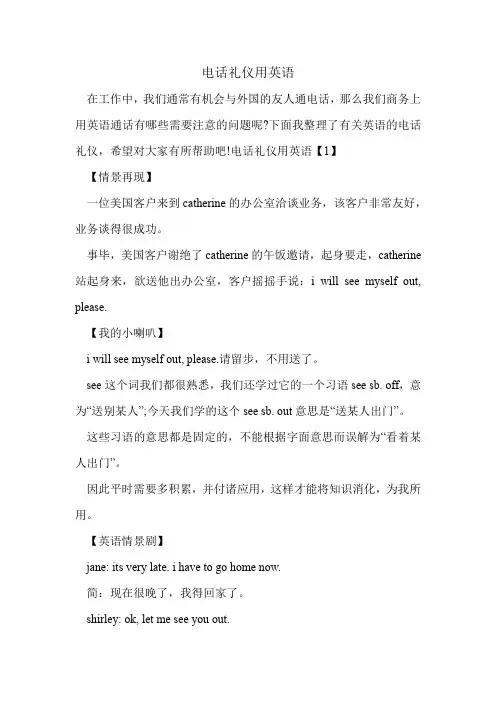
电话礼仪用英语在工作中,我们通常有机会与外国的友人通电话,那么我们商务上用英语通话有哪些需要注意的问题呢?下面我整理了有关英语的电话礼仪,希望对大家有所帮助吧!电话礼仪用英语【1】【情景再现】一位美国客户来到catherine的办公室洽谈业务,该客户非常友好,业务谈得很成功。
事毕,美国客户谢绝了catherine的午饭邀请,起身要走,catherine 站起身来,欲送他出办公室,客户摇摇手说:i will see myself out, please.【我的小喇叭】i will see myself out, please.请留步,不用送了。
see这个词我们都很熟悉,我们还学过它的一个习语see sb. off,意为“送别某人”;今天我们学的这个see sb. out意思是“送某人出门”。
这些习语的意思都是固定的,不能根据字面意思而误解为“看着某人出门”。
因此平时需要多积累,并付诸应用,这样才能将知识消化,为我所用。
【英语情景剧】jane: its very late. i have to go home now.简:现在很晚了,我得回家了。
shirley: ok, let me see you out.雪莉:好吧,那我送你出去。
jane: well, ill see myself out, thank you.简:哦,谢谢,请留步。
【情景再现】tom最近他经常陪一名美国同事参加商务会议,可他还和平常一样,随便穿一件休闲衣就赶去参加会议,完全没有一个职业经理人的样子。
一天,参加完会议,美国同事提议他去商场买套西装,而tom不以为然,这位同事就说:you know that chothes make the man.【我的小喇叭】clothes make the man. 人靠衣装。
我们经常说“人靠衣装,马靠鞍”,这句话的对应英文就是clothes make the man.值得注意的是这里的make的用法,它在此意为“有利于的发展,创造出,产生”,例如:practice makes a winning team.勤加训练必有助于球队获得胜利。
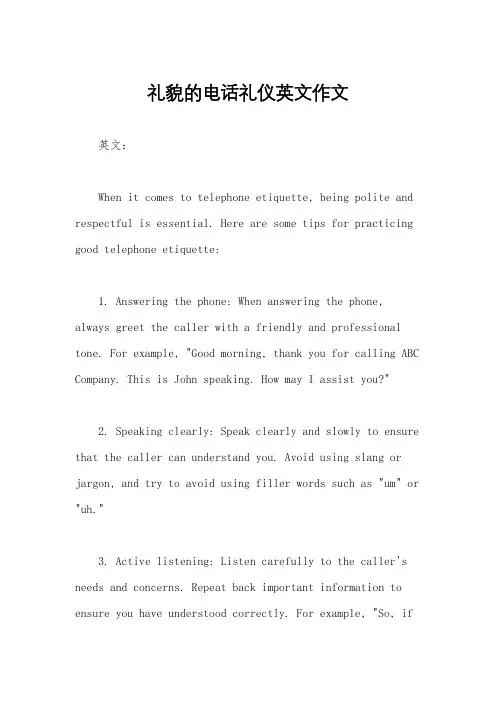
礼貌的电话礼仪英文作文英文:When it comes to telephone etiquette, being polite and respectful is essential. Here are some tips for practicing good telephone etiquette:1. Answering the phone: When answering the phone, always greet the caller with a friendly and professional tone. For example, "Good morning, thank you for calling ABC Company. This is John speaking. How may I assist you?"2. Speaking clearly: Speak clearly and slowly to ensure that the caller can understand you. Avoid using slang or jargon, and try to avoid using filler words such as "um" or "uh."3. Active listening: Listen carefully to the caller's needs and concerns. Repeat back important information to ensure you have understood correctly. For example, "So, ifI understand correctly, you are looking for information on our new product line?"4. Being patient: Be patient and understanding, especially if the caller is upset or frustrated. Stay calm and professional, and try to find a solution to their problem.5. Ending the call: End the call politely and professionally. Thank the caller for their time and offer any additional assistance if necessary. For example, "Thank you for calling ABC Company. Have a great day!"中文:在电话礼仪方面,保持礼貌和尊重是非常重要的。
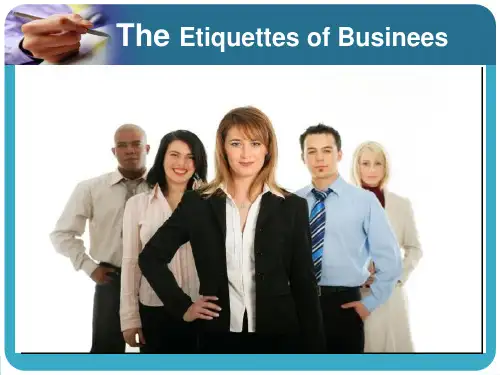
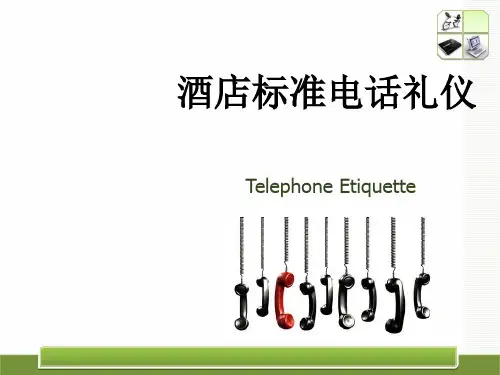
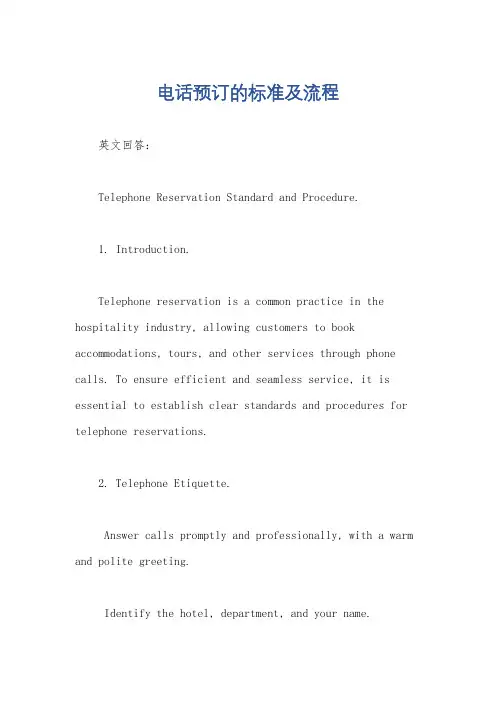
电话预订的标准及流程英文回答:Telephone Reservation Standard and Procedure.1. Introduction.Telephone reservation is a common practice in the hospitality industry, allowing customers to book accommodations, tours, and other services through phone calls. To ensure efficient and seamless service, it is essential to establish clear standards and procedures for telephone reservations.2. Telephone Etiquette.Answer calls promptly and professionally, with a warm and polite greeting.Identify the hotel, department, and your name.Be attentive and patient, listening carefully to customer inquiries.Speak clearly and at a moderate pace, ensuring the customer can understand you.Use respectful and courteous language, avoiding jargon or technical terms.3. Gathering Customer Information.Inquire about the customer's name, contact information (phone number and email address), and arrival/departure dates.Ask for the number of guests, room type preferred, and any special requests.Verify the spelling and pronunciation of names and information.4. Room Availability and Confirmation.Check the hotel's availability based on the customer's request.Inform the customer of available room types and rates.Once a room is selected, confirm all details with the customer, including the reservation number, room type, dates, price, and payment method.5. Handling Special Requests.Note and accommodate special requests such as accessibility needs, early check-in/late check-out, or room preferences.If a special request cannot be fulfilled, explain the situation politely and offer alternative options.6. Payment and Deposit.Inform the customer about payment options, including credit cards, debit cards, and cash.Collect a deposit or full payment as required by hotel policy.Provide a clear breakdown of charges and confirm with the customer.7. Reservation Confirmation.Send a confirmation email to the customer summarizing the reservation details.Include the reservation number, hotel information,room type, dates, price, and any special requests.Provide contact information for any queries or changes.8. Post-Call Follow-Up.Thank the customer for their reservation.Wish them a pleasant stay at the hotel.Note any additional information or requests for the customer's file.中文回答:电话预订标准及流程。
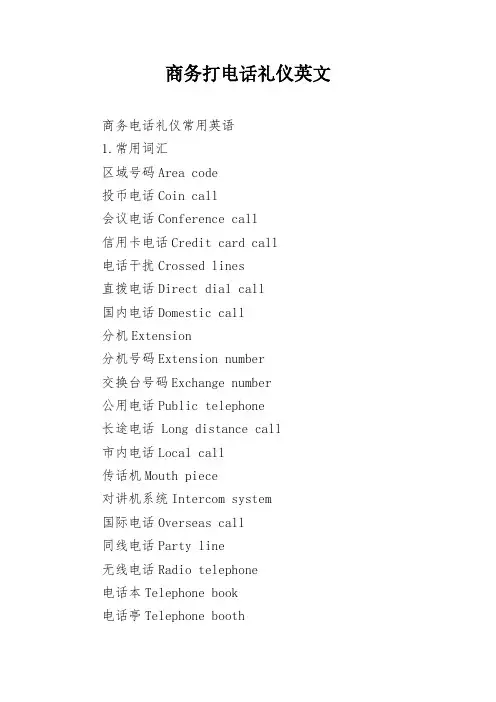
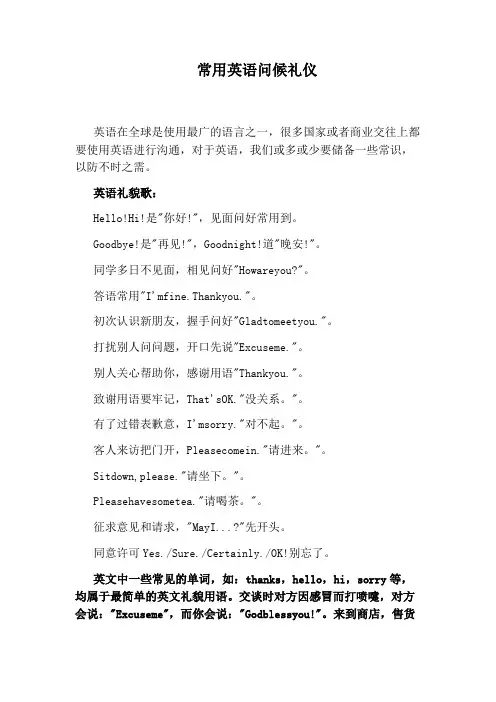
常用英语问候礼仪英语在全球是使用最广的语言之一,很多国家或者商业交往上都要使用英语进行沟通,对于英语,我们或多或少要储备一些常识,以防不时之需。
英语礼貌歌:Hello!Hi!是"你好!",见面问好常用到。
Goodbye!是"再见!",Goodnight!道"晚安!"。
同学多日不见面,相见问好"Howareyou?"。
答语常用"I'mfine.Thankyou."。
初次认识新朋友,握手问好"Gladtomeetyou."。
打扰别人问问题,开口先说"Excuseme."。
别人关心帮助你,感谢用语"Thankyou."。
致谢用语要牢记,That'sOK."没关系。
"。
有了过错表歉意,I'msorry."对不起。
"。
客人来访把门开,Pleasecomein."请进来。
"。
Sitdown,please."请坐下。
"。
Pleasehavesometea."请喝茶。
"。
征求意见和请求,"MayI...?"先开头。
同意许可Yes./Sure./Certainly./OK!别忘了。
英文中一些常见的单词,如:thanks,hello,hi,sorry等,均属于最简单的英文礼貌用语。
交谈时对方因感冒而打喷嚏,对方会说:"Excuseme",而你会说:"Godblessyou!"。
来到商店,售货员会礼貌地问一句:"CanIhelpyou,please?"。
这些都是语言礼貌原则的体现。
人们表达礼貌的方式多种多样。
英文礼貌用语例句:1.Ithoughtyouwereneedingme,Mr..Singer.(用过去时表示礼貌);2.MayIcomein,please?(用情态动词表示礼貌);3.Everypieceofluggagehastobeexaminedthrough.(用被动式表示礼貌);等等。
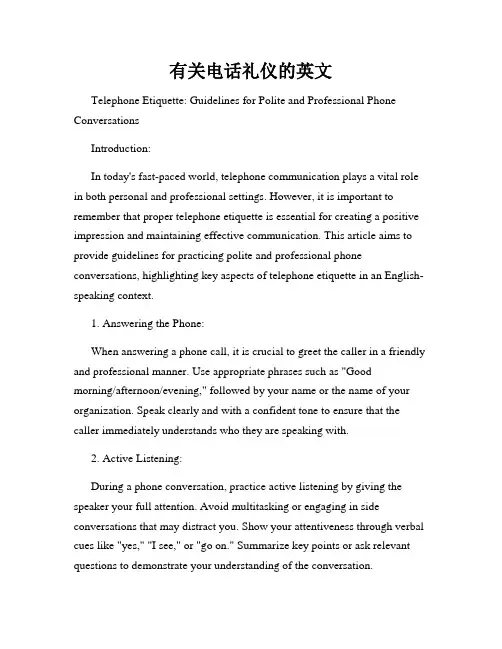
有关电话礼仪的英文Telephone Etiquette: Guidelines for Polite and Professional Phone ConversationsIntroduction:In today's fast-paced world, telephone communication plays a vital role in both personal and professional settings. However, it is important to remember that proper telephone etiquette is essential for creating a positive impression and maintaining effective communication. This article aims to provide guidelines for practicing polite and professional phone conversations, highlighting key aspects of telephone etiquette in an English-speaking context.1. Answering the Phone:When answering a phone call, it is crucial to greet the caller in a friendly and professional manner. Use appropriate phrases such as "Goodmorning/afternoon/evening," followed by your name or the name of your organization. Speak clearly and with a confident tone to ensure that the caller immediately understands who they are speaking with.2. Active Listening:During a phone conversation, practice active listening by giving the speaker your full attention. Avoid multitasking or engaging in side conversations that may distract you. Show your attentiveness through verbal cues like "yes," "I see," or "go on." Summarize key points or ask relevant questions to demonstrate your understanding of the conversation.3. Speaking Clearly and Concisely:When speaking on the phone, it is vital to articulate your words clearly for effective communication. Avoid mumbling, speaking too fast, or using slang that may be unfamiliar to the other person. If necessary, slow down your speech and enunciate each word to ensure that your message is understood accurately. Additionally, strive to be concise and to the point, so as not to waste the caller's time.4. Tone and Volume:Maintaining an appropriate tone and volume is crucial for conveying the right message over the phone. Speak in a friendly and respectful tone, even during difficult or challenging conversations. Avoid raising your voice or sounding impatient, as it can create a negative impression on the caller. Make an effort to modulate your voice to ensure clarity and convey professionalism.5. Professionally Handling Transfers and Holds:When transferring a call or putting someone on hold, seek the caller's permission and provide an explanation for the transfer or hold. Assure the caller that their issue will be addressed promptly. If the wait time is expected to be extended, offer alternatives such as taking a message or arranging a callback. Always thank the caller for their patience and apologize for any inconvenience caused.6. Confidentiality and Privacy:Respecting confidentiality and privacy is crucial when dealing with phone conversations. Avoid discussing sensitive or personal information inpublic places or where others can overhear the conversation. Ensure that sensitive data, such as credit card details or identification numbers, are securely handled and not audible to unauthorized individuals.7. Ending the Conversation:When concluding a phone conversation, it is essential to end on a positive and courteous note. Summarize any action steps or agreements made during the conversation to ensure clarity and avoid misunderstandings. Thank the caller for their time, using phrases like "Thank you for calling," "I appreciate your assistance," or "Have a great day." Always end the call in a polite and professional manner.Conclusion:Mastering telephone etiquette is crucial for effective communication in today's interconnected world. By following these guidelines for polite and professional phone conversations, you can ensure that you create positive impressions, foster better relationships, and maintain smooth communication with others. Remember, a courteous and respectful approach goes a long way in building trust and leaving a lasting impact, even through a simple phone call.。
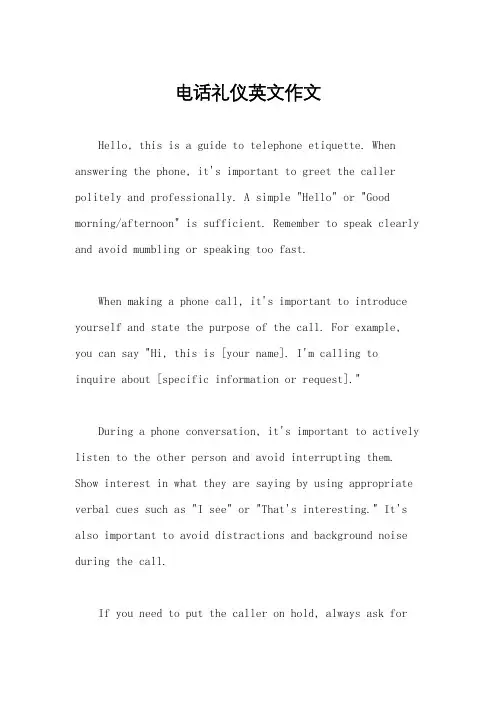
电话礼仪英文作文Hello, this is a guide to telephone etiquette. When answering the phone, it's important to greet the caller politely and professionally. A simple "Hello" or "Good morning/afternoon" is sufficient. Remember to speak clearly and avoid mumbling or speaking too fast.When making a phone call, it's important to introduce yourself and state the purpose of the call. For example, you can say "Hi, this is [your name]. I'm calling toinquire about [specific information or request]."During a phone conversation, it's important to actively listen to the other person and avoid interrupting them. Show interest in what they are saying by using appropriate verbal cues such as "I see" or "That's interesting." It's also important to avoid distractions and background noise during the call.If you need to put the caller on hold, always ask fortheir permission first. Say something like "May I put you on hold for a moment?" and wait for their response. When you return to the call, thank them for waiting and apologize for the interruption.When ending a phone call, it's important to do so politely and professionally. You can say "Thank you for your time" or "I appreciate your help." If necessary, summarize any important points discussed during the call and confirm any next steps or follow-up actions.If you receive a voicemail message, make sure to listen to it carefully and respond in a timely manner. When leaving a voicemail message, speak clearly and provide your name, contact information, and a brief message regarding the purpose of your call.Remember, telephone etiquette is important in both personal and professional settings. By following these guidelines, you can ensure effective and respectful communication over the phone.。
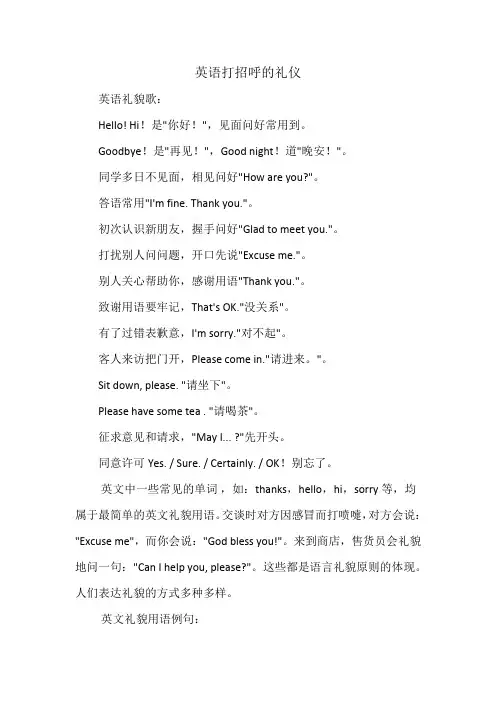
英语打招呼的礼仪英语礼貌歌:Hello! Hi!是"你好!",见面问好常用到。
Goodbye!是"再见!",Good night!道"晚安!"。
同学多日不见面,相见问好"How are you?"。
答语常用"I'm fine. Thank you."。
初次认识新朋友,握手问好"Glad to meet you."。
打扰别人问问题,开口先说"Excuse me."。
别人关心帮助你,感谢用语"Thank you."。
致谢用语要牢记,That's OK."没关系"。
有了过错表歉意,I'm sorry."对不起"。
客人来访把门开,Please come in."请进来。
"。
Sit down, please. "请坐下"。
Please have some tea . "请喝茶"。
征求意见和请求,"May I... ?"先开头。
同意许可Yes. / Sure. / Certainly. / OK!别忘了。
英文中一些常见的单词,如:thanks,hello,hi,sorry等,均属于最简单的英文礼貌用语。
交谈时对方因感冒而打喷嚏,对方会说:"Excuse me",而你会说:"God bless you!"。
来到商店,售货员会礼貌地问一句:"Can I help you, please?"。
这些都是语言礼貌原则的体现。
人们表达礼貌的方式多种多样。
英文礼貌用语例句:1. I thought you were needing me, Mr. .Singer.(用过去时表示礼貌);2. May I come in, please?(用情态动词表示礼貌);3. Every piece of luggage has to be examined through.(用被动式表示礼貌);等等。
1、I was referred to you by Mr. Gordon.我是Gordon 先生介绍我来的。
打电话到别人公司如果是有求于人的话,例如要去应征啦或是推销东西啦,最好能先攀点关系啦!例如最常用的招数,我是某某人介绍来的,就是"I was referred to you by someone." (注意,介绍在这里用refer 而不是用introduce.)还有呢?如果你今天拿到了该公司的折价卷,则最好也是开宗明义地说,"I got your number from a coupon,which says your product is 50% off today." (我是根据你们折价卷上的号码打过来的,它上面写着今天产品五折优待。
)这样子让他想赖都赖不掉。
总之呢?先表明自已是怎么搭上这条线的,这样子别人才不会有突兀的感觉啦。
2、I‘m calling to check my order status.我打电话来查看我订单的状况。
以前我因为不知道check order status 这个用法,常拉拉杂杂讲了一堆才能表达我的意思。
例如我可能会说,"I ordered something yesterday. Can you check if you‘ve shipped it or not." 这句话听起来是不是蛮笨的?后来我暗中观察,同样的情况原来老美居然都简简单单地说"I want to check my order status." 或是"I want to track my order status." 就能完整地表达这句话的意思,真是太神奇了。
这让我想到有一次在机场也是,我想问柜台小姐我的朋友倒底坐哪一班飞机,那班飞机有没有慢分,他大概几点会到,当我好不容易讲完这么长一串时,柜台小姐居然只回了我一句,"You wanna check passenger status?" 差点没昏到,原来我只要用check passenger status 就行了喔?3、I‘d like to place an order for a DL-1100 color printer.我想要下一份DL-1100 彩色印表机的订单。
超全整理外企常用英文外企在全球范围内运作,所以英语成为了其最常用的交流语言。
在与外企打交道过程中,熟悉一些常用的外企英文是非常重要的。
下面是一些外企常用英文的整理,希望对您有所帮助。
一、日常工作英文表达1. Greetings and Introductions(问候与介绍)- Good morning/afternoon/evening. 早上好/下午好/晚上好。
- How are you? 你好吗?- Nice to meet you. 很高兴见到你。
- My name is... 我的名字是...- I'm from... 我来自...2. Making Requests(提出请求)- Could you please...? 你可以...吗?- Would you mind...? 你介意...吗?- Can you help me with...? 你可以帮我...吗?- I would appreciate it if you could... 如果你能...我将非常感激。
3. Giving Instructions(给出指示)- Please... 请...- Make sure to... 确保...- Remember to... 记住...- Don't forget to... 不要忘记...4. Meeting and Conference Calls(会议与电话会议)- I'd like to call this meeting to order. 我想召开这次会议。
- Let's move on to the next agenda item. 我们继续下一个议程。
- Can everyone hear me clearly? 大家都能听得清楚吗?- I'd like to invite [name] to present their report. 我想邀请[name]来介绍他们的报告。
常用的电话礼仪英语作文Title: Mastering Telephone Etiquette: Key Practices for Effective Communication。
In today's fast-paced world, telephone communication remains an integral part of our daily interactions. Mastering telephone etiquette is essential for effective communication in both personal and professional settings. Whether making or receiving calls, observing proper telephone etiquette ensures clarity, professionalism, and respect. In this essay, we will explore the key practices of telephone etiquette and their importance.First and foremost, it's crucial to answer the phone promptly and courteously. When answering a call, greet the caller warmly and identify yourself and your organizationif applicable. For example, "Good morning, XYZ Company,this is [Your Name] speaking. How may I assist you?" This initial greeting sets a positive tone for the conversation and establishes professionalism.Moreover, active listening is fundamental during telephone conversations. Pay close attention to thecaller's words, tone, and intent. Avoid interrupting and allow the caller to express themselves fully before responding. Reflective listening techniques, such as paraphrasing and summarizing, demonstrate respect and understanding. For instance, you might say, "If Iunderstand correctly, you're experiencing issues with our product. Is that correct?"Furthermore, clarity and conciseness are essential when speaking on the phone. Speak clearly and at a moderate pace, enunciating your words to ensure understanding. Avoid using slang or technical jargon that may confuse the caller. If conveying complex information, break it down into manageable chunks and allow the caller to ask questions for clarification.Another important aspect of telephone etiquette is maintaining a professional demeanor throughout the call. Regardless of the nature of the conversation, remain calm,courteous, and composed. Avoid raising your voice or displaying frustration, even in challenging situations. Remember, professionalism builds trust and fosters positive relationships with callers.Additionally, proper telephone etiquette extends to how calls are transferred and placed on hold. Always ask for permission before transferring a call to another party. Provide the caller with the necessary information, such as the name and extension of the person they are being transferred to. When placing a caller on hold, do so politely and explain the reason for the brief delay. Regularly check back with the caller to provide updates and avoid keeping them waiting for extended periods.Moreover, ending a call graciously is just as important as answering it courteously. Before concluding the conversation, summarize any key points discussed and ensure that the caller's needs have been addressed satisfactorily. Thank the caller for their time and offer assistance with any further inquiries. For example, "Thank you for contacting us today. If you have any more questions, feelfree to reach out. Have a great day!"In conclusion, mastering telephone etiquette is essential for effective communication in today's interconnected world. By following the key practices outlined above, you can ensure clarity, professionalism, and respect in your telephone interactions. Whether in personal or professional contexts, proper telephone etiquette contributes to positive relationships and enhances overall communication effectiveness. So, let's pick up the phone with confidence and courtesy, knowing that we are equipped with the tools to communicate effectively in any situation.。
金杭酒店电话接听标准电话交流是酒店业的一种重要的服务形式,通过电话交流可以体现出酒店的整体服务水准,只有明确员工接听电话的标准,规范接听电话的步骤,确保员工遵守电话礼仪、应用电话礼仪相应技巧,才能更好地提升我们的服务水平。
现结合东莞酒店业市场特点及本酒店的实际情况,特拟定本酒店员工的接听电话标准。
一、基本电话礼仪:a、积极的谈话态度。
b、增加你谈话的可信性,感染和影响来电者。
c、悦耳的谈话声音。
d、将笑容融入到声音中,说话清晰,充满活力,语速适中。
e、三次铃声的目标。
f、在三次铃声之内必须接听电话。
g、记住宾客的名字。
h、来电者告知其名字时,你必须特别注意,记住宾客的名字并在稍后的通话中运用它能表现出你的工作专业与投入并能使宾客感受到特别的尊贵。
i、电话中的问候。
j、专业与礼貌的对待每位来电者,应答时注意措词、专业术语、俚语或方言。
k、时刻准备为客服务。
l、熟悉掌握当天的预订情况(特别是团队和VIP)及酒店相应的产品信息,用左手拿起电话听筒,随时准备好纸和笔,右手记下电话内容。
二、接听电话程序:1、接听电话:铃响三声之内用左手拿起电话。
2、接听标准用语:②、一线对客人部门:能从来电显示中(房间号)确认此客人为外国客人应:3、解决问题/帮助①、帮客人转接电话:当有事情不清楚需要询问其他人,客人需要等候时,必须使用“HOLD”键,以免客人听到员工交流的情况;如电话无“HOLD”键或此键出现故障应用手掌捂住话筒。
③、当需要做留言记录时;引导来电者给出详细、简洁的信息,记录必须完整、准确。
(详见附件1)4、结束通话:结束通话前,询问来电者是否需要其他服务。
5、放电话:永远在确定客人挂掉电话后,才轻轻放下话筒。
三、特殊情况:①、如在三声铃响之后接听电话,应先委婉的致歉;④、时间变换问候:常用节日问候语:(各部门可视情况适当添加问候语)Happy New Year 元旦(新年好)Happy Chinese New Year 春节(新年好)Merry Christmas 圣诞快乐元旦/春节:一线对客部门:圣诞节:一线对客部门:四、特别注意:1、在知道客人的姓氏后,要尽量使用客人姓氏,而不能只说先生/小姐;2、口齿要清晰,语言要简练;3、在任何情况下,要先听客人讲话,不要随意打岔;4、在采取任何行动之前,要先得到客人允许;5、对于重要的细节要做到重复客人的话或意思,以确保准确无误;6、在接听电话时,嘴里不要含着或嚼着东西;7、总是准备好笔和纸,以方便记录重要内容;8、语音语调要平缓亲切,声线要自然流畅,不可太大声或太小声;9、要经常使用有魔力的字眼。
情况一: 打电话的人找的是你自己Is Daisy there? Daisy 在吗?Speaking. 我就是,说吧。
That's me. 我就是。
This is Daisy. 我就是Daisy.This is she. 我就是。
(注: 男的用This is he.)Y ou're speaking/talking to her. 你正在跟她说话。
情况二: 要找的人不在May I speak to Mr. Gates? 请问Gates 先生在吗?He's out. 他出去了。
He's not here right now. 他现在不在这里。
He's in a meeting right now. 他现在正在开会。
Y ou've just missed him. 你刚好错过他了。
He's just stepped out. 他刚好出去了。
情况三: 要找的人不在, 问对方是否要留言Can I talk to Mark? 我可以跟Mark 讲话吗?He's out on his lunch break right now. Would you like to leave a message? 他出去吃午饭了, 你要留言吗?He's not available right now. Can I take a message? 他不在, 我可以帮你传话吗?情况四: 打电话的人问他要找的人何时回来Do you know when he will be back? 你知道他什么时候会回来吗?I'm sorry. I don't know. 抱歉, 我不知道。
I have no idea. 我不知道。
He should be back in 20 minutes. 他应该二十分钟内会回来。
情况五: 打电话的人问他要找的人在哪里Do you have any idea where he is? 你知道他在哪里吗?Sorry. I don't know. 抱歉, 我不知道。
手机礼仪的英文对话智能手机的普及,使得很多人会在社交场所、工作场合放肆地使用手机,下面是为大家整理几篇手机礼仪的英文对话,希望对你有帮助。
手机礼仪的英文对话篇一A: Hey, Helen, Do you know what happened today? I got to know I suck on the phone.You know, in my old job I never used English at work. Everyone was Chinese, my co-workers, my boss,my clients (I)watched American TV programmes all the time,but this is totally different.B: You have to get used to it, most people we deal with here are foreigners. Nearly all ofthe phone calls I make are in English.A: Do you have any special rules here for making phone calls in English?B: You mean something like etiquette? Yes, there are some guidelines, but they aren'tset in stone. Different people do it in a different way.A: I think I need to go over(重温)my phone etiquette.B: Foreigners like to follow rules, especially the British. If you aren't professional on the phone, or sound unenthusiastic or indifferent, they won't want to dealwith(与;;;;打交道)you.A: OK, I had better start practicing.手机礼仪的英文对话篇二michael: hey billy, that looks like a groovy cell phone. is it new?billy: yeah - i scored it today. my old one was too big and clunky.michael: it seems like everyone has a cell phone these days.billy: i know. everywhere i go i can hear mobile phones ringing.michael: why did you call it a mobile phone and not a cell phone?billy: americans generally call them cell phones while europeans call them mobile phones.michael: you know that there are so many rules about using cell phones these days?billy: really! can you teach me some? i don't want people to think that i am rude.michael: sure. i would be happy to teach my buddy!手机礼仪的英文对话篇三A:Hello,B!I read an article about western table manners.I found that there are many similarities and differences betwee western table manners and chinese table manners.B:Yes.For example:When you are bidden to the feast,you are more interested in talking with people around you than having any dish.So when you have your meals,you should try your best to make less sound and action.A:Yes.But in western countries before hostess pick up her spoon or fork,gests mustn't taste any dish.The hostess won't start her meal until all the guests get their dishes.She won't do it like chinese,want you have first.It means that everyone can have their own meals when the hostess pick up her spoon or fork.B:And in China,people wear casual clothes when they have meals in the restaurant,even the T-shirt and jeans are available.Only in important banquet do they wear grandly.But it requires people wear formal dress.A:And the people seat of traditional chinese food is not that exquisite like in western countries.Most of them are seated according to their own willings and without napkin.B:However,it's very exquisite in western countries.A:Yes,we have a lot to learn.B:Of course。
打电话不是难事,但要得体、有效地运用电话与人沟通,还需掌握一些基本的礼节——1、如果你打电话给别人,对方一接电话,你就要报上自己的名字(identity yourself),说:"Hello, this is...speaking."/不要等待对方追问你是谁。
2、接别人打来的电话时,如果对方未报姓名,你可以礼貌地问:"Who's calling, please?" May I ask who's calling,please?”
假如对方电话中要找的人是你的同事,你也应该问这句话,让接电话的人知道是谁打来的。
3:如果你打电话给特定的某个人的话,那么你得用礼貌的问句来表达意图,例如“May I speak to Rachel Smith,please?”
4:当你只知道分机号码却不知道人名的时候你可以说:“Could I have extension number 563?”
5:但如果打电话是有特定的目的,那最好是这么说:“I'm calling to make a reservation.”6:当你需要transferred(转接)到另一部分机,你常会听到:“Connecting your call…”或者“Please hold,I'll transfer you.”。
7:如果你是在繁忙时段拨打某公司电话的话,你可能会听到简短的一句话,“Hello,please hold!”在接线员将你转到另一条线之前。
8:当你打电话的对象不在或不能接听电话时,准备好留言。
你可以使用voicemail(电子录音系统)或一部answering machine(在磁带上录音的一种机器)。
如果你正和接线员讲话的话,他们会问:“Would you like to leave a message?”或者你可以说,“May I leave a message?如果想要对方回电话的话,千万别忘了留你的电话号码。
这被称作call back number.
9:如果你不确定你能听清所有的对话,一定要坦诚。
直接告诉对方:“Could you please speak slowly?”大部分的人会赞许你的诚实并很高兴这么做。
10、万一你拨通了一个号码,却从对方接听时的口气,发觉你可能拨错电话时,千万不要反问人家:"What number is this?"而是要问你拨的号码对不对,例如:"Is this 85925-563?"如果对方告诉你拨错了,赶快说:"I'm sorry."然后把电话轻轻挂上。
11、假如你接到别人拨错的电话,你可以说: "I think you have the wrong number. This is 85925-563."然后把电话轻轻挂上。
不要摔电话!拨错电话号码都是无心的。
12、打电话应该要言不繁。
讲完该讲的话时,通常由拨电话的先说:"Goodbye."我们可以加一句:"Thank you for your calling."然后双方挂上电话,记住要轻哦。